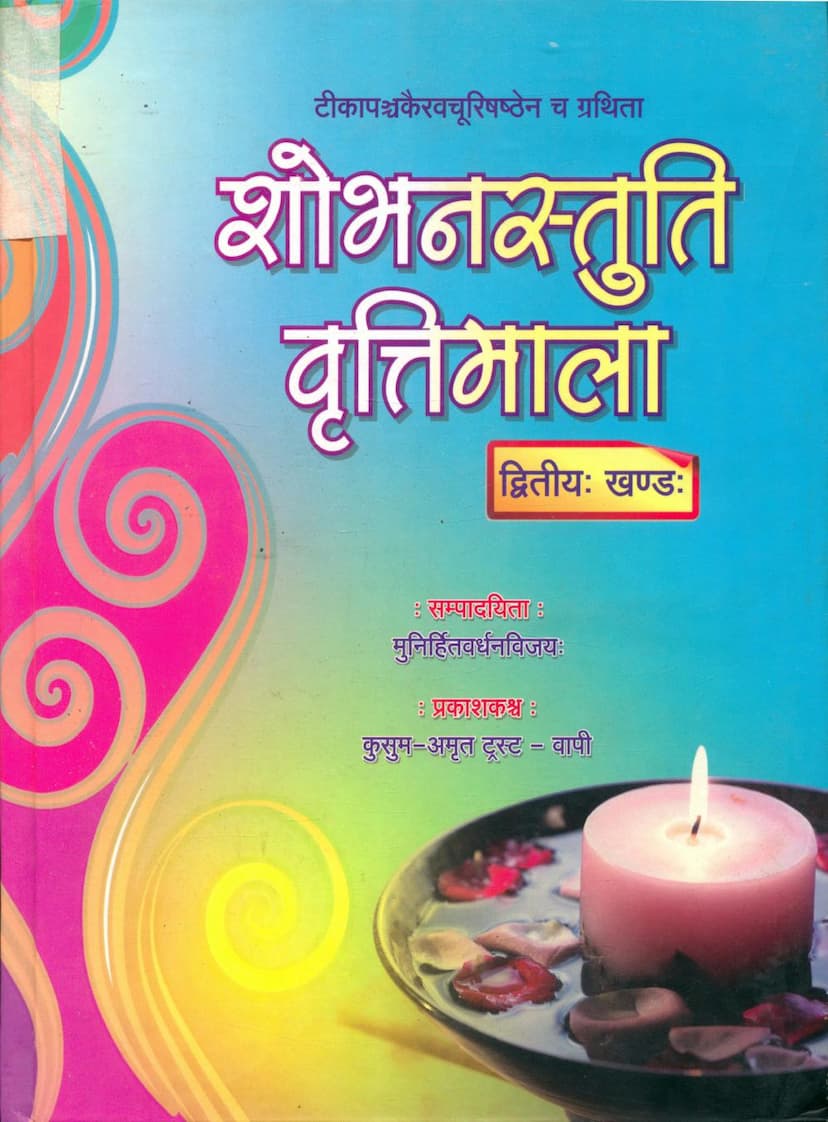Shobhan Stuti Vruttimala Part 02
Added to library: September 2, 2025

Summary
The provided text is the second part of "Shobhan Stuti Vruttimala" (शोभनस्तुति-वृत्तिमाला), a Jain text compiled and edited by Muni Hitvardhanvijay and published by Kusum Amrut Trust. This particular volume focuses on hymns and their commentaries dedicated to the Tirthankaras from Shri Vimalnath to Shri Mahavir.
Here's a summary of the key information presented in the text:
- Title: Shobhan Stuti Vruttimala Part 02 (शोभनस्तुति-वृत्तिमाला द्वितीयः खण्डः)
- Author/Compiler: Muni Hitvardhanvijay (सम्पादयिता - मुनिहितवर्धनविजयः)
- Publisher: Kusum Amrut Trust, Vapi (प्रकाशक - कुसुम-अमृत ट्रस्ट - वापी)
- Content: This volume is a collection of hymns and their commentaries pertaining to the Tirthankaras from the 13th Tirthankara, Shri Vimalnath, up to the 24th Tirthankara, Shri Mahavir.
- Original Hymn: The original hymns are attributed to the esteemed Shobhan Muni (स्तुतिरचयितारः - पूज्याः शोभनमुनीश्वराः), who lived in the latter half of the 11th century Vikram Samvat. The hymns are composed in Sanskrit, in metered verses (specifically the "Prithvi" meter), and each verse is characterized by the use of the "Yamaka" (यमक) poetic device, where words with similar sounds but different meanings are employed for rhetorical effect.
- Commentaries (Tikas and Avachuri): The text highlights the significant scholarly effort involved in compiling and preserving these hymns. It lists multiple commentators (टीकाकर्तारः) who wrote explanations (टीका) on Shobhan Muni's hymns, along with their respective estimated verse counts and periods of composition:
- Shri Jayavijayji Gani (श्रीजयविजयाः): Approximately 2350 verses (अनुष्टुपः), composed around 1671 Vikram Samvat.
- Shri Siddhi Chandra Ganivar (श्रीसिद्धिचन्द्रगणिनः): Approximately 2200 verses (अनुष्टुपः), composed in the first half of the 17th century Vikram.
- Shri Saubhagya Sagar Suri (श्रीसौभाग्यसागरसूरयः): Verse count not specified due to remaining portions. Composed around 1778 Vikram Samvat.
- Shri Devachandra Ganivar (श्रीदेवचन्द्रगणिनः): Verse count not specified. Composed in the 17th century Vikram.
- Dhanpal Kavi (धनपालकवयः): 1000 verses (अनुष्टुपः), composed in the 11th century Vikram.
- Chirantanacharya (चिरन्तनाचार्याः): An Avachuri (a brief commentary or paraphrase) is also mentioned, but its verse count is undetermined due to lack of available material.
- Compilation Significance: This volume is noted as a pioneering effort to bring together the original hymn, five different commentaries, and one Avachuri on a single subject, totaling seven distinct Sanskrit works in one collection. This is presented as a rare achievement in Jain literature, especially in devotional texts.
- Editorial Work: The editor, Muni Hitvardhanvijay, has added approximately fifty new annotations (टिप्पण) to the text, clarifying grammatical and sometimes scriptural (Agamic) inaccuracies found in earlier editions or original texts.
- Publication: The publication of both parts of "Shobhan Stuti Vruttimala" was made possible through the inspiration of Shri Mangalvardhanvijay Maharaj and the financial support of the Kusum Amrut Trust, utilizing the trust's dedicated knowledge funds. The first edition was published in 2066 Vikram Samvat (2010 CE).
- Distribution: The text mentions that the compilation will be respectfully offered to Jain monks and nuns (साधु-साध्वीजी भगवन्तो) and Jain knowledge repositories (ज्ञानभंडार).
- Financial Aspect: For householders, it's advised to contribute to the "knowledge fund" (ज्ञानद्रव्य) before studying the book. The price for purchasing a copy is mentioned as Rs. 400/- to be registered in the knowledge fund.
The text also includes dedications and praises to prominent Jain acharyas like Shri V. Ramachandrasurishwarji Maharaj and Shri Bhavyavardhanvijay Maharaj, highlighting the lineage and blessings behind this significant publication. The initial pages also contain Sanskrit verses of veneration for the Tirthankaras.
The latter part of the provided text consists of detailed Sanskrit verses from the hymns to Shri Vimalnath, Shri Anantnath, Shri Dharma Nath, Shri Shanti Nath, Shri Kuntlu Nath, Shri Arha Nath, Shri Malli Nath, Shri Munisuvrat Nath, Shri Nami Nath, Shri Nemi Nath, Shri Parshva Nath, and Shri Vir Jin, along with their extensive commentaries in Sanskrit by various acharyas. These commentaries delve into the etymology of words, poetic devices, philosophical interpretations, and the auspicious qualities of the Tirthankaras.